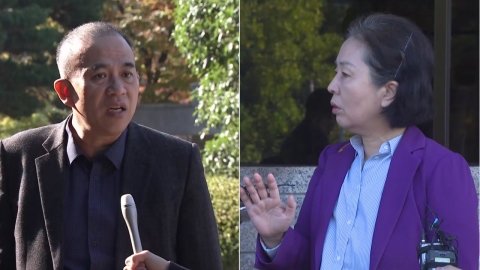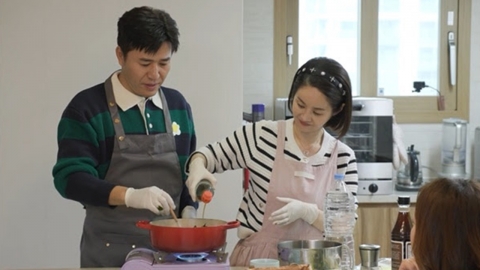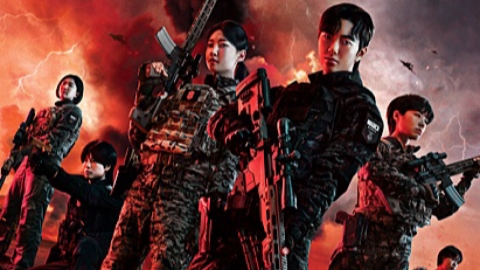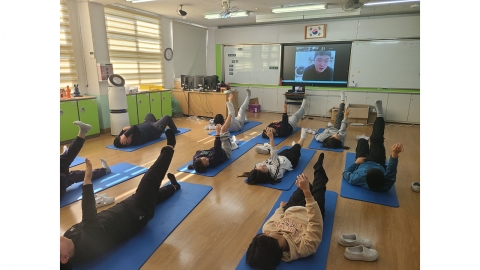■ Starring: Lawyer Lim Joo-hye
* The text below may differ from the actual broadcast content, so please check the broadcast for more accurate information. Please specify [YTN News Special] when quoting.
[Anchor]
Since President Yoon's sudden declaration of emergency martial law last night, there has been a big aftermath in the political world. Let's take a closer look at the case one by one with lawyer Lim Joo-hye. Welcome. First of all, the legal professionals who declared martial law were also very surprised last night. Lawyer Lim Joo-hye was surprised, too, right?
[Lim Joo-hye]
That's right. I think it's right to think that it's an unpredictable situation. Although I work as a lawyer, there will be things that will be worth a close look at by opening martial law like this. Actually, I don't think anyone could have predicted it.
[Anchor]
Did you take a closer look at the constitution this time?
[Lim Joo-hye]
That's right. It was a situation where we had no choice but to open up the constitution and martial law, but if we first look at the Chinese character word martial law, we will be strict about vigilance. So, it is a measure to temporarily transfer authority to the military when the country is very unstable to the point of strict vigilance, enabling enormous restrictions on the basic rights that the Korean people originally enjoyed. That's why I think it's right to see it as a very exceptional reason, or one that can hardly happen, as I think it happened on December 3, 2024, and eventually our descendants will learn this day very importantly by remembering this date.
[Anchor]
The Republic of Korea is a democratic republic. There's a constitution. Article 77, Paragraph 1 of the Constitution stipulates emergency martial law. Please explain it in detail.
[Lim Joo-hye]
That's right. Now, emergency martial law is also in the Constitution. The relevant details are also included in the martial law law. We can compare the two articles together, and as I said, martial law can be seen as martial law to deal with exceptional emergencies through military intervention when there is a military need or a risk of causing great harm to public order in a very unusual war event or a national emergency. According to this martial law law, there is an emergency martial law and a vigilance law, which can be imposed when it is identified as a wartime incident or a similar emergency, and in the case of security law, it can be declared in the event of social chaos or security unrest, which can be considered a little lower.
[Anchor]
When the president declared martial law yesterday, he used this expression. Pro-North Korean anti-state forces are seeking to overthrow the system. At the same time, he mentioned the large opposition party's push for budget and the abuse of impeachment, but then it is controversial whether that part corresponds to the exceptional wartime situation you just mentioned.
[Lim Joo-hye]
In fact, when we express it legally, the president's decision is an act of governance. The act of governing means that it is based on economic or social judgments because the president can be given broad discretion, and it does not legally consider the advantages or disadvantages of this act. However, in this case, martial law was finally imposed, and considering the requirements for martial law to be imposed, did the actual conditions meet? I think this part needs to be pointed out.
As you said now, there are two main reasons why the martial law mentioned on the spot was declared when there was an urgent conversation by the President of Yoon Suk Yeol yesterday. One is the issue of cutting the budget that the Democratic Party is doing. From the president's point of view, if the budget is cut, the government is making it impossible for me to live and for me to manage this family well because it is a position to make a household without living expenses. I made this argument, but in the end, the essence is a matter of budget cuts.
The second was not directly talking about the impeachment demand and the impeachment demand against the president, which continues to be a problem, but there were now attempts to impeach the auditor. Repeated attempts to impeach prosecutors. Because these parts have been going on, this is the kind of emergency situation that is equivalent to wartime events because this part is embodying the functions of the Board of Audit and Inspection and the functions of the inspection organization. President Yoon Suk Yeol seems to have recognized that this is an emergency situation. However, an emergency equivalent to an wartime incident can be seen as an extremely exceptional situation. That's why the majority of the people are now in a situation where tanks should appear in the middle of Seoul? If it is possible to ask that this is an emergency situation like this, I think it is a reasonable interpretation to see that these conditions are not met. It is pointed out that the fact that everyone accepted the situation surprisingly is a national risk situation equivalent to a wartime incident.
[Anchor]
Are you saying that there are elements that are unconstitutional and illegal?
[Lim Joo-hye]
It is difficult to avoid criticism that this was an unreasonable attempt without substantive requirements or at least without sufficient explanation of this part.
[Anchor]
Let's take a look at the procedure. What are the procedures? There has to be deliberation by the State Council, and there has to be a proposal from the Minister of Defense or the Minister of Public Administration and Security.
[Lim Joo-hye]
That's right. If the president judges that this is a situation where I have to declare martial law, I have to go through the deliberation of the State Council. In addition, the martial law law stipulates that the Minister of Defense or the Minister of Public Administration and Security can suggest to the President that emergency martial law is necessary now through the Prime Minister if it is recognized that the country is in danger. Therefore, even in the case of the declaration of martial law, what we are hearing now is that the defense minister suggested it and it has been deliberated by the Cabinet. This procedural process is in fact a line in the law. When such a national crisis occurs, the president can declare martial law, and when he wants to declare martial law, it goes through deliberation by the State Council. This one line is shown, and it is specifically how, what kind of people gather, what kind of process, and how much debate has been properly deliberated.
[Anchor]
How the deliberation is defined will also be different.
[Lim Joo-hye]
That's right. Since the deliberation and resolution are different, the resolution will require at least a majority of the members of the State Council to attend and two-thirds to agree on a certain part, but deliberation is a word that can be used widely, such as a team meeting or an exchange of doctors within an internal organization. However, since there has never been such a situation before, if this situation is judged by the court or there is a judgment on its legitimacy, it will be necessary to carefully examine whether this process has been deliberated and who suggested it.
[Anchor]
So, even if all the lawmakers who attended opposed it, this itself cannot be seen as a problem because there are only deliberation regulations.
[Lim Joo-hye]
That's how the interpretations are coming out. If a vote should be made, it should be checked whether at least a majority of the members of the State Council attended, but the names of the members have not been confirmed properly. Since only a part of the situation has been confirmed, this part needs to be discussed once more, and if it is just a deliberation, it is the president who can finally declare emergency martial law, so even if these State Council members and ministers are reluctant about this part and say it is dangerous, it is true that if the president finally declares it, he can declare it.
[Anchor]
It took six hours from the declaration of the emergency martial law to the lifting. It is a process of looking into whether there were any unconstitutional or illegal elements for six hours. Martial law decree No. 1 came out. In fact, when emergency martial law is declared, the martial law command intervenes in the private sector and is in charge of security administration. That's why the full text of martial law declaration No. 1 came out. There were six provisions. Can you introduce the content briefly?
[Lim Joo-hye]
When I saw that, I realized that this was really martial law. Before that, even though I was watching the news, what is this? What's the situation? I wondered if it was the martial law I learned from the constitution I saw when I was studying, but after seeing the martial law decree, I realized once again that this really happened in Korea. Under whose name did this martial law decree come out? It came out in the name of the martial law commander. If martial law is declared at this time, a lot of power will inevitably be concentrated on the martial law commander. The martial law commander will have the power to control all the final responsibility or control this part in general administrative, life, and justice. If you look at the contents of the martial law decree, it contained the contents of blocking all access to the National Assembly. It included a ban on political activities. And the medical community was in the midst of noisy and problematic conditions, but referring to this medical worker who did not return, as a strike, it could be punished under the Military Criminal Law if he did not return within 48 hours. And as a result, to summarize this, since this is a very serious situation, people's basic rights, basic freedom of speech, or freedom of political activity can be greatly restricted. And even without a warrant, it says that arrest or these parts are possible, so this was a measure that limited the basic rights of the people that could be possible in martial law situations.
[Anchor]
I see. You're seeing an armed martial law soldier entering the National Assembly. I just showed you the screen where the martial law army broke the window and entered the main building of the National Assembly. Is there no illegal element here?
[Lim Joo-hye]
Now, those martial law soldiers were actually just carrying out the orders from above according to the principle of command and subordination. They must have been ordered to enter the National Assembly, and I don't think it's easy to hold each of them accountable for the illegal part because they do these things according to the command and order, rather than arbitrarily judging them. In any case, they need to take into account the status that there was martial law enforced according to the law and had no choice but to follow the order above.
[Anchor]
In this regard, the National Assembly released CCTV footage. The National Assembly says armed martial law forces infiltrated the compound and attempted to storm the Capitol shortly after Yoon Suk Yeol's president declared emergency martial law. The released CCTV shows soldiers wielding rifles to break down office windows.
You saw the CCTV footage of the National Assembly. The opposition party is talking about rebellion. What is the scope of the rebellion when martial law forces are even raising the possibility that they are involved in the rebellion?
[Lim Joo-hye]
That's right. There's also a reason why rebellion is bound to appear. In the case of the President, he is not criminally prosecuted except for the crime of civil war and foreign exchange. Not being prosecuted means not being prosecuted, which is why the recognition of the crime of rebellion is also very important for President Yoon Suk Yeol. The crime of civil war is stated in the criminal law, and it can be seen as the crime of rioting for the purpose of national suffering or national constitution. As an alternative word that we can often think of, we can think of something like a coup. So, the criminal law is very serious about those who have caused situations such as riots and coups, and even the death penalty is possible for the mastermind of this. Depending on the degree of participation and participation, the severity of the crime of rebellion is determined differently, and since it can be sentenced to at least five years in prison or imprisonment, if the declaration of the emergency martial law yesterday and those who participated in the declaration can be held accountable for the crime of rebellion, whether or not the crime of rebellion will be established is a pleading matter, and if the crime of rebellion is applied, it is necessary to consider whether or not it will be applied very carefully because it can be prosecuted from the president's point of view and the punishment is very heavy.
[Anchor]
You're looking at the scene right now. This is the image of the CCTV screen yesterday. You're seeing 280 armed martial law soldiers enter the National Assembly compound. I think it will be a big issue whether the president of Yoon Suk Yeol can be applied as a crime of rebellion. What issues do you think will be an issue?
[Lim Joo-hye]
As you said, if the crime of rebellion is applied, prosecution is possible with the remaining term of office, so this is very important. As mentioned earlier, the prerequisite for the crime of rebellion is a riot that completely shakes the nation's discipline.
When there is a coup and a riot, it is applied as a rebellion, and for example, if it is a coup to usurp the presidency, we can be punished for rebellion. In Yoon Suk Yeol's case, it is possible to determine whether martial law meets the legal and procedural requirements later, but anyway, President Yoon Suk Yeol declared an emergency martial law yesterday, put in the military, and a series of processes were carried out under the declaration of emergency martial law, which is the president's authority under the constitution. If the National Assembly finally asked for the lifting of the emergency martial law and passed it, and Yoon Suk Yeol refused to accept it and refused to declare it lifted, or declared it still a state of emergency, then there would be room for another debate about whether to commit civil war because the constitution and the law violated procedures, but now the president has declared the emergency martial law, which he thinks is his right, and eventually the National Assembly demanded that the emergency martial law be lifted by a majority, so we need to see if this will be a crime of rebellion.
[Anchor]
However, some lawmakers were unable to enter the National Assembly conference hall and went over the wall. So, there are opinions in the legal profession that it is illegal to block entry to the National Assembly conference hall. What do you think about that?
[Lim Joo-hye]
That's right. In principle, lawmakers are actually the ones who are chosen on behalf of the people. When making decisions, all the people can't show their hands and make decisions, so they have replaced those who can represent us with people called lawmakers, and these lawmakers have given the authority to make decisions directly related to the safety of the people and their rights in the place of the National Assembly. If so, in fact, entering the National Assembly and discussing within this National Assembly is directly related to the basic rights of the people. Therefore, under the current emergency rule, these lawmakers were blocked from entering the National Assembly, and as a result, this was to limit the basic rights of the people, so this blocking is highly likely to be a problem. In any case, the lawmakers were able to gather very quickly into the National Assembly yesterday, and it was finally put on the agenda of the plenary session, and the emergency martial law was lifted by a majority vote. If you look at this in itself, I think it showed this part of how democracy works and how the rule of law turns it back.
Four hours before the martial law was declared, he contacted the police chief to wait for an emergency. How do you see this process?
[Lim Joo-hye]
In fact, the problem with this part is that there should have been a process to declare this emergency martial law. According to the president's judgment, the Constitution and martial law stipulate that emergency martial law be declared after deliberation by the State Council, and the National Assembly should be notified immediately. In the end, if you look at this process, there must have been a part where you listen to the opinions of many people. It's a very important decision. However, even before the martial law was declared, the president had already told the police chief not to go anywhere and to stand by before the announcement of the martial law, after calculating that I would declare martial law and that martial law would be declared today. It is a situation where it can be pointed out that the priorities of this part have been reversed in the procedure.
[Anchor]
I see. Let's take a look at the process of lifting martial law in the National Assembly. What is the process of lifting martial law? If the National Assembly demands the lifting, martial law is immediately lifted. Is there any illegal point in this part?
[Lim Joo-hye]
That's right. As mentioned earlier, it can be seen that there are many parts that rely on the president's full judgment in the stage of martial law. In the president's judgment, the country is in a very critical situation, so if it is judged that there is a need to declare an emergency martial law, it is required to be deliberated by the State Council, but the deliberation does not have to be approved by all the members of the State Council, so the president is actually allowed to declare martial law right away, but the law also has such a safety device. When a request for the lifting of martial law is made with the approval of a majority of the members of the National Assembly, the President shall lift it. There are no clues in place. It is stated in the law that if the martial law is requested to be lifted with the approval of the majority, this martial law will be lifted. That's why even though it was late yesterday, Democratic Party lawmakers and ruling party lawmakers, including Chairman Han Dong-hoon, were able to participate in the meeting, and the martial law was finally lifted in six hours because the martial law was lifted with the approval of all 190 people.
[Anchor]
And among the questions, martial law was declared yesterday. It was a situation where it was necessary to inform the public about it. How is it stipulated to inform you? And how is it supposed to be notified when you release it?
[Lim Joo-hye]
There was a regulation in the National Assembly that if martial law came out immediately, it should be notified. It would have been necessary to inform the National Assembly at least through an official route to notify the National Assembly immediately. In the case of President Yoon Suk Yeol, whether he informed the National Assembly properly or not, so whether he notified the National Assembly immediately or not is a problem. It has also become a hot topic that the people have implemented this martial law through the media and through statements, but there was no safety text message yesterday. The Ministry of Public Administration and Security is supposed to send disaster messages in the event of heavy snow, worsening weather, and natural disasters, but the ministry failed to inform the public yesterday whether it was an urgent situation or not because of discussions with related agencies. These parts are also being raised as a controversy.
[Anchor]
I'll give you the last question. The presidential impeachment bill is being reported to the plenary session tomorrow morning. The vote will take place as early as the day after tomorrow, but if the impeachment is passed, what legal procedures will be taken in the future?
[Lim Joo-hye]
First of all, the process of impeachment is very strict. A majority of the lawmakers should propose impeachment against the president of Yoon Suk Yeol. It doesn't end here, and in the end, two-thirds of the votes are much higher than the majority of these lawmakers, and two-thirds of them agree to vote for impeachment. First of all, I think one point to watch is how much the Democratic Party will sympathize with the people's power because it is not enough to pass this two-thirds number. So if impeachment is voted on by the National Assembly, the Yoon Suk Yeol president's duties will be suspended from then on. If so, from then on, if the prime minister acts as an acting president, the ball will be handed over to the Constitutional Court. Then, the Constitutional Court will proceed with the impeachment trial, and it took about three months for former President Park Geun Hye. And in the case of former President Roh Moo Hyun, going back further before, it took about two to three months. In fact, during that period, confusion among the people increases and the acting system moves, so if the impeachment goes to the Constitutional Court and goes to the impeachment trial this time, the confusion of the people will inevitably increase.
[Anchor]
I see. Thank you very much. I listened carefully to the legal issues one by one. I was with lawyer Lim Joo-hye. Thank you.
※ 'Your report becomes news'
[Kakao Talk] YTN Search and Add Channel
[Phone] 02-398-8585
[Mail] social@ytn. co. kr
[Copyright holder (c) YTN Unauthorized reproduction, redistribution and use of AI data prohibited]
Politics
More- The ruling party will oppose the "impeachment plan."Han Dong-hoon Calls for 'President to Leave and Apologize'
- Democratic Party "Ruling Party Against Impeachment, Civil War Offenders...Prosecutor's handling of impeachment"
- Prosecutors' Request for Audit for 'Promotion of Impeachment', Resolution of Opposition's Independent plenary session
- "President Yoon's impeachment bill" was reported to the plenary session.a vote as early as tomorrow









